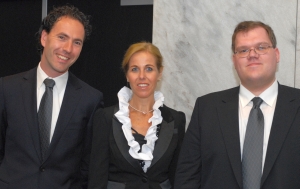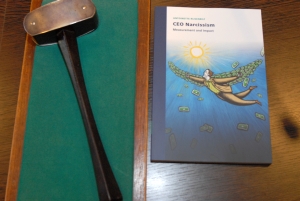CEO Narcissism: Measurement and Impact
 Narcissism forms an essential element for effective leadership and is as such an important personal characteristic for CEOs. In her dissertation entitled CEO Narcissism: Measurement and Impact, Antoinette Rijsenbilt describes the objective measurement of CEO narcissism and its impact on organizational outcomes.
Narcissism forms an essential element for effective leadership and is as such an important personal characteristic for CEOs. In her dissertation entitled CEO Narcissism: Measurement and Impact, Antoinette Rijsenbilt describes the objective measurement of CEO narcissism and its impact on organizational outcomes.
Rijsenbilt applies the psychological theory about narcissism (Emmons, 1984; Emmons, 1987) to collect objective CEO narcissism variables for 953 S&P500 CEOs. Most data are hand-collected from various databases. The new insight is that narcissism can be measured by objective variables enabling shareholders, directors, and other stakeholders to monitor CEO narcissism.
The results show that the composed CEO narcissism score reflects the psychologically validated factor solution of narcissism. CEOs who have been identified as narcissists by leading psychologists have a high score on this scale. These findings may be relevant for shareholders, board members, accountants, and society in general. A modest balanced level of CEO narcissism can be productive and value adding to a company. This confirms views of narcissism as an essential element for effective leadership. All parties involved should be aware of the potential destructive behavior of high levels of CEO narcissism. This points to the necessity of carefully monitoring the individual CEOs narcissistic personality, maybe even incorporated it into corporate governance codes.
Antoinette Rijsenbilt defended her dissertation on June 23 2011 at Erasmus School of Economics, Erasmus University. Her promoters were Prof.dr. A.G.Z. Kemna and Prof.dr. H.R. Commandeur. Other members of the Doctoral Committee were Prof.dr. Ph.H.B.F. Franses, Prof.dr. H.G. Schmidt, and Prof.dr. J.J. Boonstra.
About Antoinette Rijsenbilt
Antoinette Rijsenbilt received her doctoral degree in Business Economics in 1991 from the Erasmus University Rotterdam. She worked as a financial controller for multinational and SME companies until 2009. During the 1990s she studied psychology at the University of Amsterdam and in 2006 she received her degree as first grade lecturer from the Vrije University of Amsterdam. From 2006 to 2009 she combined her financial controlling work with lecturing at a pre-university school (VWO). Since 2009 she participates the Mature Talent Program of the Erasmus University Rotterdam to write a PhD. Her research interests include behavioral economics and accounting.
Abstract of CEO Narcissism: Measurement and Impact
 This research describes the objective measurement of CEO narcissism and its impact on organizational outcomes. Narcissism forms an essential element for effective leadership and is as such an important personal characteristic for CEOs.
This research describes the objective measurement of CEO narcissism and its impact on organizational outcomes. Narcissism forms an essential element for effective leadership and is as such an important personal characteristic for CEOs.
CEO narcissism can be measured by investigating five determinants of CEO behavior, comprising media exposure, compensation, power, growth and perquisites. The CEO narcissism score is based on these five determinants by a massive data collection of fifteen objective variables for 953 S&P500 CEOs. The composed CEO narcissism score reflects the psychologically validated factor solution of narcissism. CEOs who have been identified as narcissists by leading psychologists have a top score in this research.
The results of the first empirical impact study show an intricate relationship between CEO narcissism and financial accounting performance measures which can be visualized by a concave parabola. This relationship confirms the view that narcissism is an essential element for effective CEO leadership, but is however not without its pitfalls for either too low or too high levels of narcissism.
The results of the second empirical impact study indicate a negative relationship between CEO narcissism and countervailing power of the board. High narcissistic CEOs do not tolerate contradiction and surround themselves with followers.
The third impact study examines the relationship between CEO narcissism and fraud propensity as alleged in AAERs by the SEC. The results show that high narcissistic CEOs are more inclined to commit managerial fraud to keep up appearances and retain their status.
The empirical results theoretically contribute to the psychological perspective of narcissism as a double edged sword and provide an indication to expand the upper echelon theory with the CEOs narcissistic personality.
The practical contribution of this research enables stakeholders to monitor CEO narcissism by applying objective measures and trying to retain productive CEO narcissism levels.


